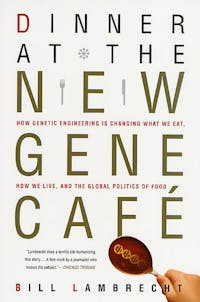Dinner at the New Gene Café
How Genetic Engineering Is Changing What We Eat, How We Live, and the Global Politics of Food
 Download image
Download image
ISBN10: 0312302630
ISBN13: 9780312302634
Trade Paperback
400 Pages
$27.99
CA$31.50
With a new Afterword by the author. Recent headlines will tell you that biotechonology companies are knocking down barriers as they race one another to alter the genetic building blocks of the world's food. In the United States, the primary venue for this quiet revolution, the acreage of genetically modified crops has soared from zero to more than 70 million acres since 1996. More than half of America's processed grocery products—from cornflakes to granola bars to diet drinks—contain gene-altered ingredients. But the U.S., unlike Europe and other democratic nations, does not require labeling of modified food. Resistance to this technology is growing fast and furious—sometimes even violent.
Dinner at the New Gene Café lays out the battle lines of the impending collision between a powerful but unproved technology and a gathering resistance from people worried about the safety of genetic change and the power of those who own the technology. Amid the furor, this precocious science is cutting applications of dangerous insecticides, and the next wave of modified crops could deliver more nutritious food—even food that wards off disease. But even before people weigh the potential costs and benefits, this Mendelian magic is thrusting itself on the world in Orwellian fashion.
Journalist Bill Lambrecht has watched the technology from its inception and traveled the world to witness its introduction. Timely and important, Dinner at the New Gene Café examines the growing international struggle over a matter that is vital to everyone on the planet: the very nature of our food, who shall shape our food supply, and who shall own it.
Reviews
Praise for Dinner at the New Gene Café
"Lambrecht's work on this vital topic not only led the rest of the world media, but also gave government leaders in many countries their first clue of what was happening within their borders . . . His style of reporting and writing not only vividly explains this complex topic to the reader, but he does it with color and background that makes the book a great read."—Andrew Schneider, Senior National Correspondent, Seattle Post-Intelligencer
"Lambrecht does a terrific job humanizing this story . . . This is a fine work by a journalist who knows his subject."—Chicago Tribune
"Gives both sides of the issue a fair, informative, sympathetic and often fascinating hearing."—The Vancouver Sun
"The first great story of the new century, and Bill Lambrecht owns it. At the juncture of science and politics, he reports and writes with unmodified purity."—Richard Ben Cramer, author of Joe DiMaggio: The Hero's Life and What It Takes: The Way to the White House
"Dinner at the New Gene Café gives consumers, farmers, and environmentalists plenty of food for thought about the need to take food policy control away from the corporate profiteers."—Jim Hightower, author of If the Gods Had Meant Us to Vote They Would Have Given Us Candidates
"Stunningly comprehensive and intensely absorbing. Should be required reading for anyone who eats."—Kirkus Reviews (starred)
"Genetically modified food has mobilized intense, fearful, anticapitalist, and antiglobalist opposition, especially in the past three years, when the most visible developer of this type of food, Monsanto in St. Louis, has tried to export its products to Europe. This report by a St. Louis Post-Dispatch writer covers in detail the company's research into the genetic engineering of plants, the reception of its new products among several farmers in Illinois, and the public-relations and political battles that swirled around 'Frankenfood,' to use its critics' pejorative. Lambrecht also writes about the reactions of advocacy groups, both business associations supporting genetically modified food and the constellation of self-avowed environmental groups opposing it. He then reports on the studies, international conferences, regulatory decisions, and occasional acts of vandalism that have taken place. An inquisitive, evenhanded work by a knowledgeable journalist, this puts the cacophony of generally negative headlines about the subject into perspective."—Gilbert Taylor, Booklist
"This book captures the mystery, potentials, and perils of modified genes in mankind's food chain. It's a thriller. It's genetic yin and yang. It's reporting from across the globe by a superb political and environmental journalist. And it may change your life."—Neal Peirce
"Lambrecht takes what could be a dry topic and dishes out a great read for those who wonder—or worry—what this brave new world is likely to yield."—The Washington Post
"If we are what we eat, everyone should be concerned about the story Lambrecht tells."—Larry King
"An indispensable history of the political storm surrounding GMOs . . . This book's greatest asset is the firsthand testimony it gives from every side of the debate."—Publishers Weekly
"Genetically engineered food, commonly referred to as genetically modified organisms (GMOs), is the subject of this study by Lambrecht, a reporter for the St. Louis Post-Dispatch. He describes the issues raised by advocates and detractors, with reports from the United States, Canada, Ireland, France, Britain, Switzerland, India, Colombia, and other countries. Supporters believe that biotechnology is the answer to feeding the world with safe and nutritious foods that are resistant to insect and disease damage, profitable for farmers, and vital for developing sustainable farming systems. Opponents, on the other hand, claim that GMOs pose health and environmental threats and demand mandatory labeling. (Some have resorted to violence and crop destruction to gain recognition.) The role of Monsanto, the major player in launching the food biotechnology crusade worldwide, is stressed throughout. Those seeking a better understanding of food biotechnology and its ramifications should read this work."—Irwin Weintraub, Brooklyn College Library, New York, Library Journal


